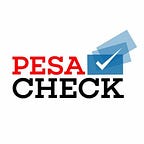SATIRE: This article grossly exaggerates HELB’s waiver of charges for compliance certificates
The waiver only applies to those who never sought or received loans from the financier of higher education in Kenya.
An article published by satirical website Postamate.com claiming that the Higher Education Loans Board (HELB) has promised to refund all the money it has collected for compliance certificates is FALSE.
According to the article, the financier of higher education in Kenya would refund double the amount it had ‘stolen’ from Kenyans as a ‘repentant move.’
Those eligible for refunds will start receiving their money back from September 2120, the post adds satirically.
However, the announcement made by HELB on July 16 on the waiver of the Kshs 1, 000 fee it chargers to process compliance certificate did not mention any refunds as claimed by the article.
Additionally, the waiver was not to the benefit of everyone as the article suggested. Rather, it was only targeted on non-beneficiaries of HELB loans seeking compliance certificates. The waiver is also already in effect since July 15, 2020.
According to the statement, the HELB compliance certificate enables institutions to assess the creditworthiness, social responsibility and integrity of job seekers before hiring them.
Previously, the requirement for a clearance certificate has applied to both beneficiaries of HELB loans and non-beneficiaries alike.
But according to HELB CEO Charles Ringera, the institution determined from various stakeholder engagements and citizen feedback that the charges for non-loanee compliance certificates were perceived to be punitive especially by many unemployed youths.
Mr Ringera said that the waiver would serve to “motivate Kenyan youth to seek their HELB compliance certificates as they seek jobs or opportunities to contribute towards building the nation.”
PesaCheck has looked into the claim that the Higher Education Loans Board (HELB) has promised to refund all the money it has collected for compliance certificates, and finds it to be SATIRE.
This post is part of an ongoing series of PesaCheck fact-checks examining content marked as potential misinformation on Facebook and other social media platforms.
By partnering with Facebook and similar social media platforms, third-party fact-checking organisations like PesaCheck are helping to sort fact from fiction. We do this by giving the public deeper insight and context to posts they see in their social media feeds.
Have you spotted what you think is fake news or false information on Facebook? Here’s how you can report. And, here’s more information on PesaCheck’s methodology for fact-checking questionable content.
This fact-check was written by PesaCheck Fact-Checker Simon Muli and edited by PesaCheck Deputy Editor Enock Nyariki.
The article was approved for publication by PesaCheck Managing Editor Eric Mugendi.
PesaCheck is East Africa’s first public finance fact-checking initiative. It was co-founded by Catherine Gicheru and Justin Arenstein, and is being incubated by the continent’s largest civic technology and data journalism accelerator: Code for Africa. It seeks to help the public separate fact from fiction in public pronouncements about the numbers that shape our world, with a special emphasis on pronouncements about public finances that shape government’s delivery of Sustainable Development Goals (SDG) public services, such as healthcare, rural development and access to water/sanitation. PesaCheck also tests the accuracy of media reportage. To find out more about the project, visit pesacheck.org.
PesaCheck is an initiative of Code for Africa, through its innovateAFRICA fund, with support from Deutsche Welle Akademie, in partnership with a coalition of local African media and other civic watchdog organisations.
